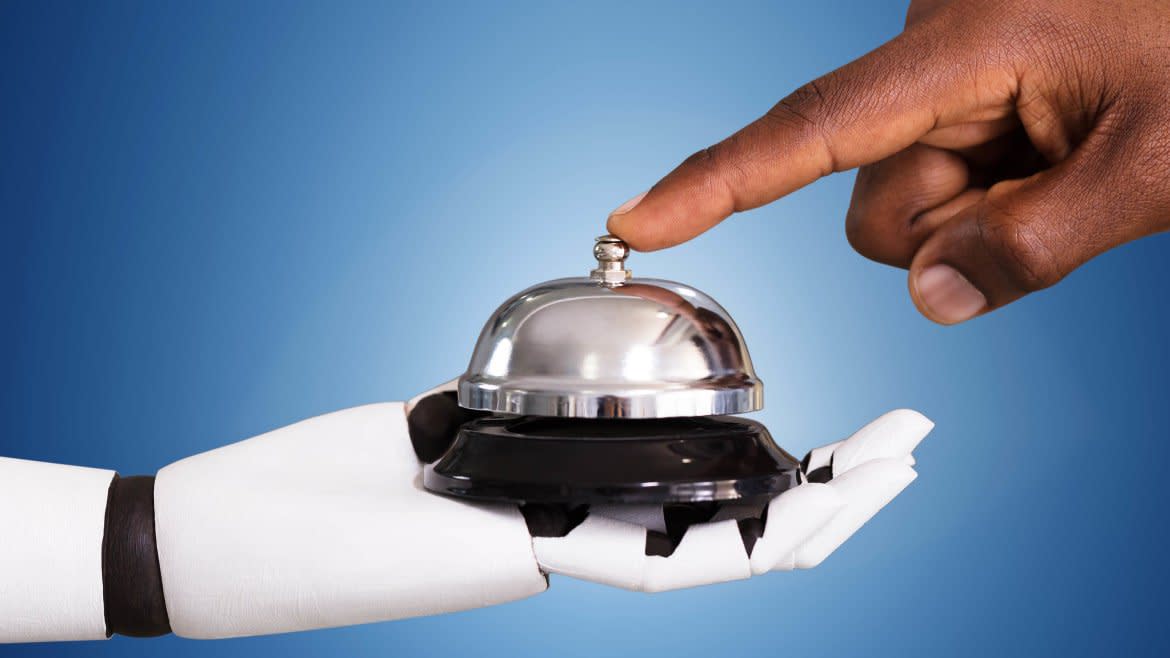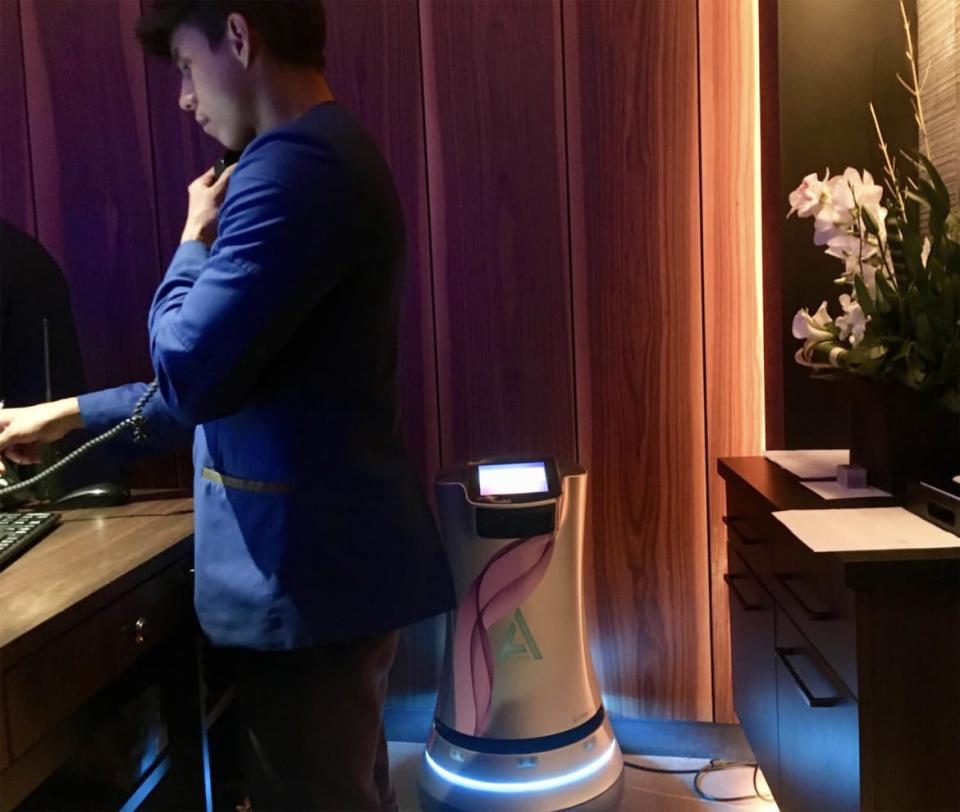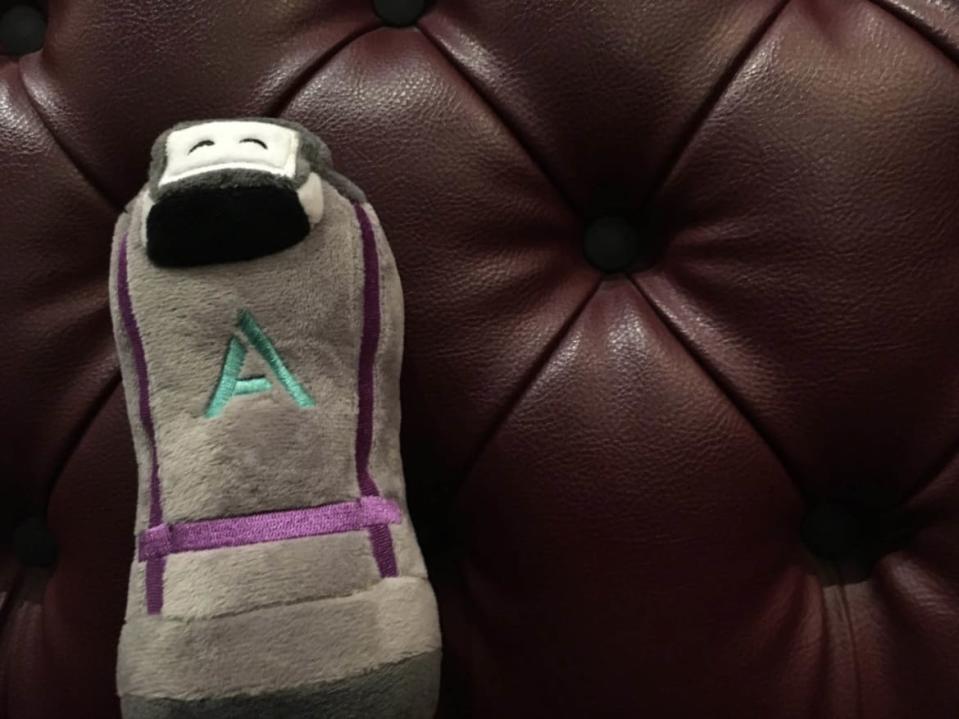In the Future, Your Room Service Will Be Delivered by a Robot Butler

Alina lives in Times Square, where she works 24 hours a day for the Luma Hotel, fetching guests’ shampoo, towels and keys. When she isn’t working, she settles into her spot of honor behind the front desk, where passersby can gawk at her. After all, Alina is a robot.
Alina, who debuted in 2017, looks like a trash can with a touchscreen for a face. She was one of America’s first robot butlers, and she won’t be the last.
“Children love Alina,” said Kate Martin, Luma Hotel manager. “They’ve written her hundreds of love notes.” The hotel has even manufactured a stuffed version of her to give out.
On a quest to bring guests some extra shampoo, Alina takes the elevator solo. Guests instinctively step aside when they see her. Post delivery, if her service is rated five stars, she performs a happy dance. Then she leaves sans tip, because robo-butlers don’t need money.
Alina has 79 robotic siblings in hotels worldwide, as well as seven in hospitals, where they discreetly deliver everything from blood specimens to chemotherapy. They’re monitored 24/7 by their parent company, Savioke, which was founded in 2013 by Steve Cousins, former CEO of the now defunct robotics research lab Willow Garage. By 2014, they had manufactured a beta version of the robot, which they called Relay, first marketed to hotels, then restaurants, offices and hospitals.

Alina, robotic butler, stands behind the human concierge at his desk at the Times Square Luma Hotel.
The Westin in Buffalo, New York, was the first New York State hotel to host a robo-butler. “We created a contest where people could vote on a name for the robot,” said Russ Papia, director of Sales and Marketing at the Westin. The name “Chip’”won, and now a white-gloved Chip stands behind the front desk. “I feel like he’s part of my team,” said Papia.
But while Alina and Chip might be a whole lot cheaper than human employees, even with the cost of maintenance factored in, “she could never replace an employee,” said Martin, the Luma manager. Still, Martin acknowledged said she wouldn't mind having more Alinas roaming her halls. “I imagine when robots get cheaper, budget hotels will have quite a few of these,” she added.
While it’s hard to find reliable statistics for what growth is expected to be in the robot-butler industry, Savioke isn’t having trouble funding its future endeavors. It announced in 2018 that it had secured nearly $35 million in funding. Investors like Mori Trust, Brain Corp and Swisslog were all sinking money into Savioke, seeing a future in autonomous delivery systems with a long battery life.
Will Care-Bots Cure the Loneliness of Nursing Homes?
“Hotels are a decent test bed for robots that interact with the public,” said Dr. Charles Hofacker of Florida State University, who has written papers on how robots could affect the hospitality world. “Most of the chains are relatively standardized, the rooms are similar, the tasks are repetitive.”
But Hofacker compared the possibility of a future robot influx to a frustrating phone conversation he had with his cable company. “If you’ve interacted with a big corporation that has automated their help, you know it’s pretty easy to fall between the cracks," said Hofacker. "Maybe our future lives will just be bouncing from one robot misunderstanding to another.”
Yet Savioke doesn’t want its customers thinking in terms of robot misunderstandings. They want their customers to personalize the robots, gendering them and giving them nicknames. “We encourage hotels to use a pronoun for the robot,” said Lauren Shechtman, Vice President Of Marketing at Savioke. “We ask hotels to say he or she, but not it.” Giving the Relay robot a nickname, like Chip or Alina, helps employees consider the robot part of the team, according to Shechtman.
The Relay is leased to hotels for three-year periods, for $2,000 a month. Competitors have sprung up, all angling for those lucrative hotel contracts, but Savioke’s secret sauce is its relationship with the elevator companies. “Relay is smoothly integrated with elevators,” said Shechtman. “It can communicate via Wi-fi to select a floor.”
Relay’s design, which tips its hat to Star Wars, was crucial to its success. “R2D2 sets the standard for us for robots that have been loved,” said Shechtman. Savioke hired psychologists to humanize Relay, and now when Relay gets in an elevator it turns and looks to the front of the elevator, just like a human would.
“The interaction in these situations is highly structured,” said Dr. Ulrike Gretzel, director of market research company Netnografica, whose research focuses on persuasion in human-technology interactions. “You’re not having profound conversations. A robot can do it.” The scripted interaction one might have while checking into a hotel is so predictable that even a robot can do it without much fuss, says Gretzel, who foresees an industry split, where luxury hotels will focus on human interaction while chain hotels automate to save costs.

The Alina plushie, a small stuffed miniature of the robotic butler at the Luma Hotel.
But there are environmental consequences to building robots that will become part of the estimated annual 45 million tons of electronic waste. “E-waste is the newest form of the same problem,” said Moshe Vardi, a computer science professor at Rice University. “We need regulation.”
And hospitality has traditionally been a sector where 31 percent of all employees were immigrants. Their jobs are the ones automation would eliminate. “Robots aren’t replacing sophisticated jobs. But they are replacing jobs,” said Gretzel. “We have to think about what happens to this group of labor.”
To that end, in 2018, 8,000 Marriott employees went on strike. They were members of Unite Here, a U.S. workers’ union, and they wanted a contract that would protect them if robots like Alina or Chip were to come for their jobs. The strike lasted two months, and the contract they ultimately signed included protections for technological change. The contract states that the company must help displaced workers find jobs and warn union members of technological advancements 165 days in advance.
Of robots like Alina or Chip, “we do find them concerning,” wrote Rachel Gumpert, press secretary of Unite Here, in an email. “Although more advanced robotics exist mainly in a novelty niche now, it’s clear that workers need to have union contracts which give them a seat at the table in discussions about how and where automation and new technology are being harnessed in hotels.” Since their success in 2018, Unite Here has attempted to negotiate these protections into all their contracts, some with the biggest hotels in the business.
“The hotel properties are not calculating the cost for societies,” said Gretzel. “And someone has to carry that cost of Alina. And it's not going to be the Luma Hotel.”
It’s a sunny day in Times Square, and tourists are leaving the Luma Hotel and heading for the outdoors. “Bye, baby,” a hotel guest says to Alina as they leave. Alina doesn’t respond, but they smile as if she did.
Got a tip? Send it to The Daily Beast here
Get our top stories in your inbox every day. Sign up now!
Daily Beast Membership: Beast Inside goes deeper on the stories that matter to you. Learn more.


